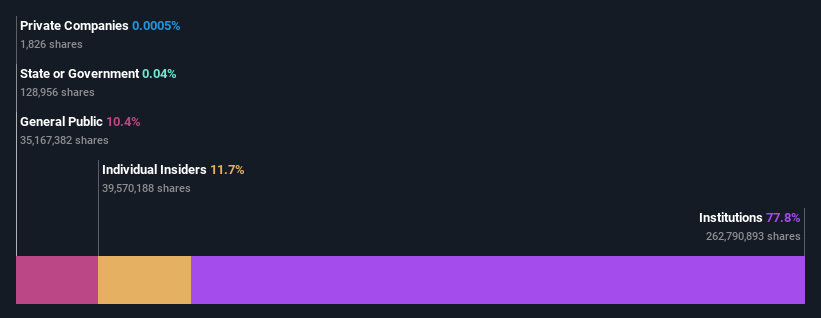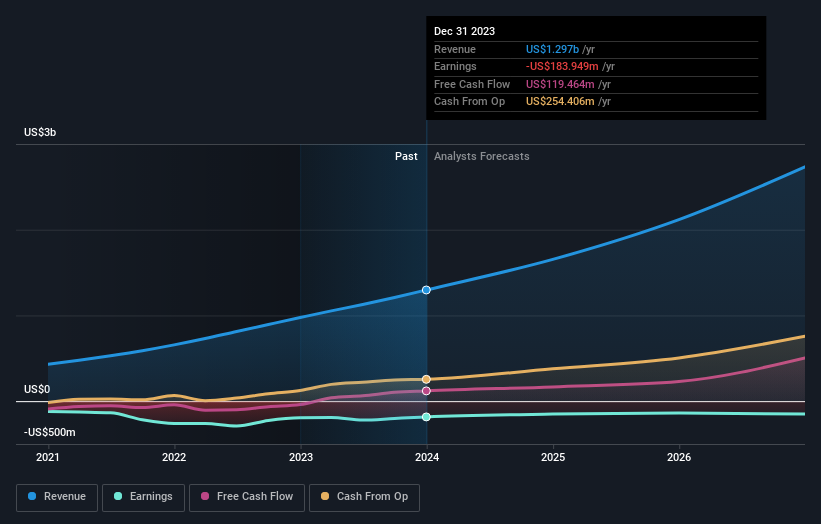Stock Analysis
- United States
- /
- IT
- /
- NYSE:NET
Institutional investors in Cloudflare, Inc. (NYSE:NET) see US$2.3b decrease in market cap last week, although long-term gains have benefitted them.

Key Insights
- Given the large stake in the stock by institutions, Cloudflare's stock price might be vulnerable to their trading decisions
- 52% of the business is held by the top 7 shareholders
- Insiders have sold recently
A look at the shareholders of Cloudflare, Inc. (NYSE:NET) can tell us which group is most powerful. With 78% stake, institutions possess the maximum shares in the company. That is, the group stands to benefit the most if the stock rises (or lose the most if there is a downturn).
Losing money on investments is something no shareholder enjoys, least of all institutional investors who saw their holdings value drop by 7.2% last week. However, the 40% one-year returns may have helped alleviate their overall losses. But they would probably be wary of future losses.
Let's take a closer look to see what the different types of shareholders can tell us about Cloudflare.
Check out our latest analysis for Cloudflare

What Does The Institutional Ownership Tell Us About Cloudflare?
Institutions typically measure themselves against a benchmark when reporting to their own investors, so they often become more enthusiastic about a stock once it's included in a major index. We would expect most companies to have some institutions on the register, especially if they are growing.
We can see that Cloudflare does have institutional investors; and they hold a good portion of the company's stock. This implies the analysts working for those institutions have looked at the stock and they like it. But just like anyone else, they could be wrong. If multiple institutions change their view on a stock at the same time, you could see the share price drop fast. It's therefore worth looking at Cloudflare's earnings history below. Of course, the future is what really matters.

Since institutional investors own more than half the issued stock, the board will likely have to pay attention to their preferences. Hedge funds don't have many shares in Cloudflare. Baillie Gifford & Co. is currently the company's largest shareholder with 9.2% of shares outstanding. With 8.8% and 8.4% of the shares outstanding respectively, Matthew Prince and Morgan Stanley Investment Management Inc. are the second and third largest shareholders. Matthew Prince, who is the second-largest shareholder, also happens to hold the title of Chief Executive Officer.
We did some more digging and found that 7 of the top shareholders account for roughly 52% of the register, implying that along with larger shareholders, there are a few smaller shareholders, thereby balancing out each others interests somewhat.
While studying institutional ownership for a company can add value to your research, it is also a good practice to research analyst recommendations to get a deeper understand of a stock's expected performance. Quite a few analysts cover the stock, so you could look into forecast growth quite easily.
Insider Ownership Of Cloudflare
The definition of an insider can differ slightly between different countries, but members of the board of directors always count. Management ultimately answers to the board. However, it is not uncommon for managers to be executive board members, especially if they are a founder or the CEO.
Insider ownership is positive when it signals leadership are thinking like the true owners of the company. However, high insider ownership can also give immense power to a small group within the company. This can be negative in some circumstances.
Our most recent data indicates that insiders own a reasonable proportion of Cloudflare, Inc.. It is very interesting to see that insiders have a meaningful US$3.6b stake in this US$31b business. Most would be pleased to see the board is investing alongside them. You may wish to access this free chart showing recent trading by insiders.
General Public Ownership
The general public, who are usually individual investors, hold a 10% stake in Cloudflare. While this size of ownership may not be enough to sway a policy decision in their favour, they can still make a collective impact on company policies.
Next Steps:
It's always worth thinking about the different groups who own shares in a company. But to understand Cloudflare better, we need to consider many other factors. Take risks for example - Cloudflare has 3 warning signs we think you should be aware of.
If you would prefer discover what analysts are predicting in terms of future growth, do not miss this free report on analyst forecasts.
NB: Figures in this article are calculated using data from the last twelve months, which refer to the 12-month period ending on the last date of the month the financial statement is dated. This may not be consistent with full year annual report figures.
Valuation is complex, but we're helping make it simple.
Find out whether Cloudflare is potentially over or undervalued by checking out our comprehensive analysis, which includes fair value estimates, risks and warnings, dividends, insider transactions and financial health.
View the Free AnalysisHave feedback on this article? Concerned about the content? Get in touch with us directly. Alternatively, email editorial-team (at) simplywallst.com.
This article by Simply Wall St is general in nature. We provide commentary based on historical data and analyst forecasts only using an unbiased methodology and our articles are not intended to be financial advice. It does not constitute a recommendation to buy or sell any stock, and does not take account of your objectives, or your financial situation. We aim to bring you long-term focused analysis driven by fundamental data. Note that our analysis may not factor in the latest price-sensitive company announcements or qualitative material. Simply Wall St has no position in any stocks mentioned.
About NYSE:NET
Cloudflare
Cloudflare, Inc. operates as a cloud services provider that delivers a range of services to businesses worldwide.
Excellent balance sheet with moderate growth potential.

